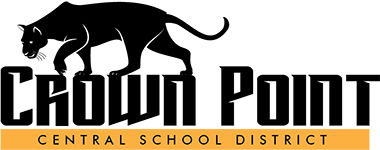The Crown Point Central School District is capable of providing student access to both the internet and electronic mail.
- Student access to the internet and electronic mail is controlled in the following ways:
- Students are not allowed to access the internet without a teacher’s supervision
- Chat rooms, News Groups and Email are not allowed to be accessed at any time
- Computers require a unique username and password to access the internet
- Computers are equipped with software that blocks and monitors access to objectionable sites
A Few Facts about the Internet
Some material accessible via the internet may contain items that are illegal, defamatory, inaccurate, or potentially offensive to some people.
Crown Point Central School is not responsible for power outages or mechanical failings that may occur on computer equipment.
All information on the internet is copyrighted material. Any information that is available on the internet is the product of another individual’s work, and must be cited if used. This information is referred to as intellectual property and includes pictures, logos, trademarks, printed materials, computer software, video, and sounds.
You can be sued for violating local obscenity laws in other localities.
Because information on the internet comes from all over the world, neither Crown Point Central School nor any staff member controls the content of this information.
The internet is a powerful resource tool. When at school, students will use it under the direction and guidance of professional staff for educational purposes only.
District Internet and Electronic Mail Policy
- The internet is an educational forum. Access to network services is given to students who agree to act in a considerate and responsible manner. All decisions regarding all aspects of student internet use and access are solely the provision of the administration, faculty, and staff of the district.
- Individual users of the district computer networks are responsible for their behavior and communications over those networks. Furthermore, while teachers are responsible for disciplining students who violate these rules, teachers are not themselves liable or responsible if a student should violate a rule such as that prohibiting access to objectionable materials.
- Network storage areas may be treated like school lockers. Network administrators may review files and communications to maintain system integrity and ensure that users are using the system responsibly. Users should not expect that files stored on district servers will always be private. The privacy of electronic mail cannot be guaranteed.
- The following are not permitted:
- sending or displaying offensive messages or pictures.
- using obscene language.
- harassing, insulting, or attacking others.
- damaging computers, computer systems or computer networks.
- violating copyright law.
- using another’s password.
- trespassing in another’s folders, work, or files.
- employing the network for commercial purposes.
- adding or downloading software without permission.
- using another user-id, password, or account on school computers to access any service.
- purchasing goods and services without administrative permission.
- political activity of any type.
- giving out personal information on the internet.
- using any internet service without a teacher present in the room.
- individual student web pages.
- forging or attempting to forge email messages.
- using the network to send anonymous messages or files.
- revealing personal address, phone number, or using personal disks on the district’s computers without permission.
- stealing data or intellectual property.
- interception without permission of one party of transmission of electronic messages.
- Violations may result in a loss of access as well as other disciplinary or legal action.
